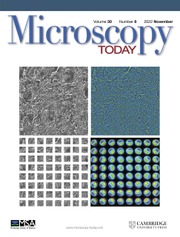
On August 1–5, 2010, the Microscopy & Microanalysis meeting was held in Portland, Oregon. This annual meeting is sponsored by the Microscopy Society of America and the Microbeam Analysis Society. The meeting was enhanced by participation of the International Metallographic Society and the Microscopical Society of Canada, both of which held their annual meetings in conjunction with M&M. The conference attracted a total of 2,768 attendees from 34 countries, making the meeting the third largest in attendance after Philadelphia in 2000 and Chicago in 2006. The equipment exhibition, always a key element of any M&M meeting, was a great success with 1,007 exhibitor attendees from 108 companies occupying 333 booths, totaling 33,300 square feet (3,094 sq metres).

Plenary speaker Prof. Mark Welland.
The M&M meeting always features a Sunday evening reception prior to the beginning of the meeting to allow attendees to reconnect with their colleagues, eat and drink, and look forward to the week's activities. This year the opening reception returned to the same location as the 1999 meeting, the Portland Zoo, which was a short tram ride from the convention center hotels. The excellent weather allowed conferees to relax and mingle and take in the zoo, as well.
The meeting focused on the latest developments in microscopy and microanalysis and their application in both the biological and materials sciences. This year highlighted sessions on scanning probe microscopy, the microanalysis of surfaces, and a symposium celebrating the achievements of Nobel Laureate George Palade, who received a Nobel Prize for his work in determining the structural and functional organization of cells.

Exhibition hall at Microscopy & Microanalysis 2010.
The opening day of the meeting featured a morning dedicated to plenary lectures, the announcement of the 2010 class of MSA Fellows, and presentations of named awards by the joining societies. David Piston, MSA President, commented, “The plenary session, which was started last year, has proven to be an outstanding way to kickoff the meeting. Not only does it give us a chance to recognize past achievements through society fellowship and major awards, but the plenary speakers also show us the present and future of microscopy through presentations that are of general interest to the entire audience. As each of our individual works become more and more specialized, this gives our attendees a unique opportunity to see the impact of microscopy on the big picture of science.”
The first plenary speaker, sponsored by MSA, was professor Mark Welland, head of the Nanoscience Centre at the University of Cambridge, who firmly established the interdisciplinary flavor of the meeting with his lecture entitled “What microscopy can tell us about Alzheimer's and related diseases.” Professor Welland treated attendees to a fascinating description of his group's scanned probe microscopy and nanomechanical analysis of fibrils that are major features of neurological diseases like Alzheimer's. Welland, although a physicist by training, has expanded his research activities into a number of areas that cross into the biosciences. His presentation laid the foundation for continued focus on SPM and Alzheimer's in subsequent symposia throughout the week.
J. Willam Schopf, a professor at UCLA, was the plenary speaker sponsored by the Microbeam Analysis Laboratory, and his lively lecture entitled “The Earliest History of Life: Solution to Darwin's Dilemma” gave those in attendance insight into the purported “gap” in the fossil record. Schopf's work, leveraged by results from light microscopy, confocal laser scanning microscopy, and Raman imaging, was a fascinating vignette of the paleobiology of the Precambrian Earth and revealed that the gap in the fossil record was merely there because no one previously had applied microscopy to the subject!
Throughout the rest of the meeting, Monday afternoon to Thursday afternoon, there were plenty of symposia and poster sessions to choose from. A total of 34 named symposia took place: 8 in the physical sciences, 8 in biological sciences, and 18 in instrumentation and techniques. These together with 7 contributed sessions, physical and biological tutorials, the Technologists Forum, and the several educational outreach activities meant that there were 643 presentations in 13 parallel platform sessions over the week. Poster sessions on Monday, Tuesday, and Wednesday saw the presentation of 371 posters. All presentations were documented in 1,014 proceedings abstracts, distributed for the first time entirely in digital form on the M&M 2010 Proceedings CD.
All in all, it was an excellent meeting. We all look forward to M&M 2011 in Nashville Tennessee, August 7–11, 2011.


